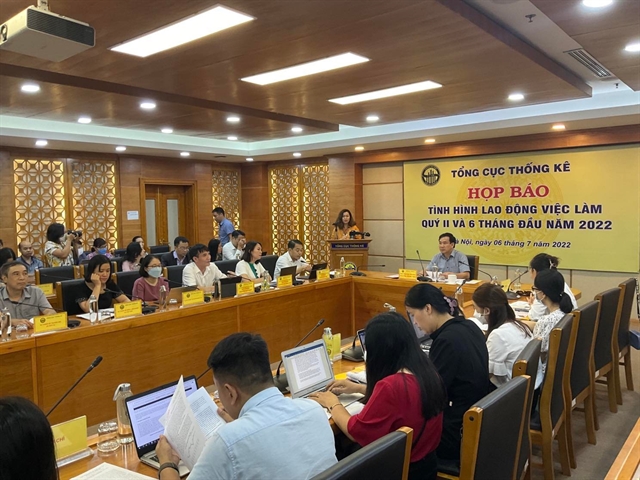 Society
Society


|
| The GSO' press conference on Wednesday. — VNA/VNS Photo Anh Đức |
Anh Đức
HÀ NỘI — The average Vietnamese worker now earns VNĐ6.5 million (US$278) a month, a rise of almost 20 per cent since 2020.
The data was presented by the General Statistics Office (GSO) of Việt Nam at a press conference in Hà Nội yesterday.
The press conference announced new data on the Vietnamese labour market in the second quarter as well as the first half of 2022.
The average monthly earnings of workers in Việt Nam have increased by VNĐ326,000 (US$13.95) compared to 2021. This is solid proof that the economy is growing strongly despite the pandemic.
"Some sectors are showing remarkable growth," said Phạm Hoài Nam, Director-General of the Population and Labour division, GSOVN. "Workers in the manufacturing industry earn on average VNĐ7.3 million monthly, a 6.9 per cent growth compared to 2021."
Male workers' earnings are 1.13 times higher than female workers, whereas city workers earn 1.24 times more than those working in the countryside.
"As we observe the quarterly workers' earnings in recent years, even before the pandemic, we saw a strange trend in 2022," said Nam.
In the period from 2019 to 2021, workers' earnings in the second quarter usually drop compared to the first quarter, due to surplus earnings of the year before and holiday bonuses being expended early.
In 2022 however, the earnings did not drop in the second quarter. Instead, a positive trend is noted compared to the first as well as the year before.
Looking at the two years of the pandemic, second-quarter earnings of 2022 have risen by 8.9 per cent compared to 2021; and by 19.7 per cent compared to 2020.
"The workers' lives are slowly returning to pre-pandemic normality," said Nam.
All 21 economic sectors also saw growth in earnings compared to 2021. Sectors such as mining, manufacturing and services saw double-digit growth.
Although the first half of 2022 brought along good news to the labour market, businesses should stay vigilant and not be complacent, said Nguyễn Trung Tiến, Deputy Director of the GSOVN.
"The pandemic is still unpredictable, new variants are still posing threats to Việt Nam. Businesses must be prepared and flexibly adapt to the pandemic," said Tiến.
Another factor pressuring the economy is rising gasoline prices as a result of the conflict in Ukraine. Tiến recommends the government stabilise the macroeconomy and control inflation, as well as support workers.
"Reducing gasoline prices in the future, as well as implementing inflation control, is the key to stabilising workers' livelihoods, especially ones negatively affected by COVID-19," said Tiến. — VNS




